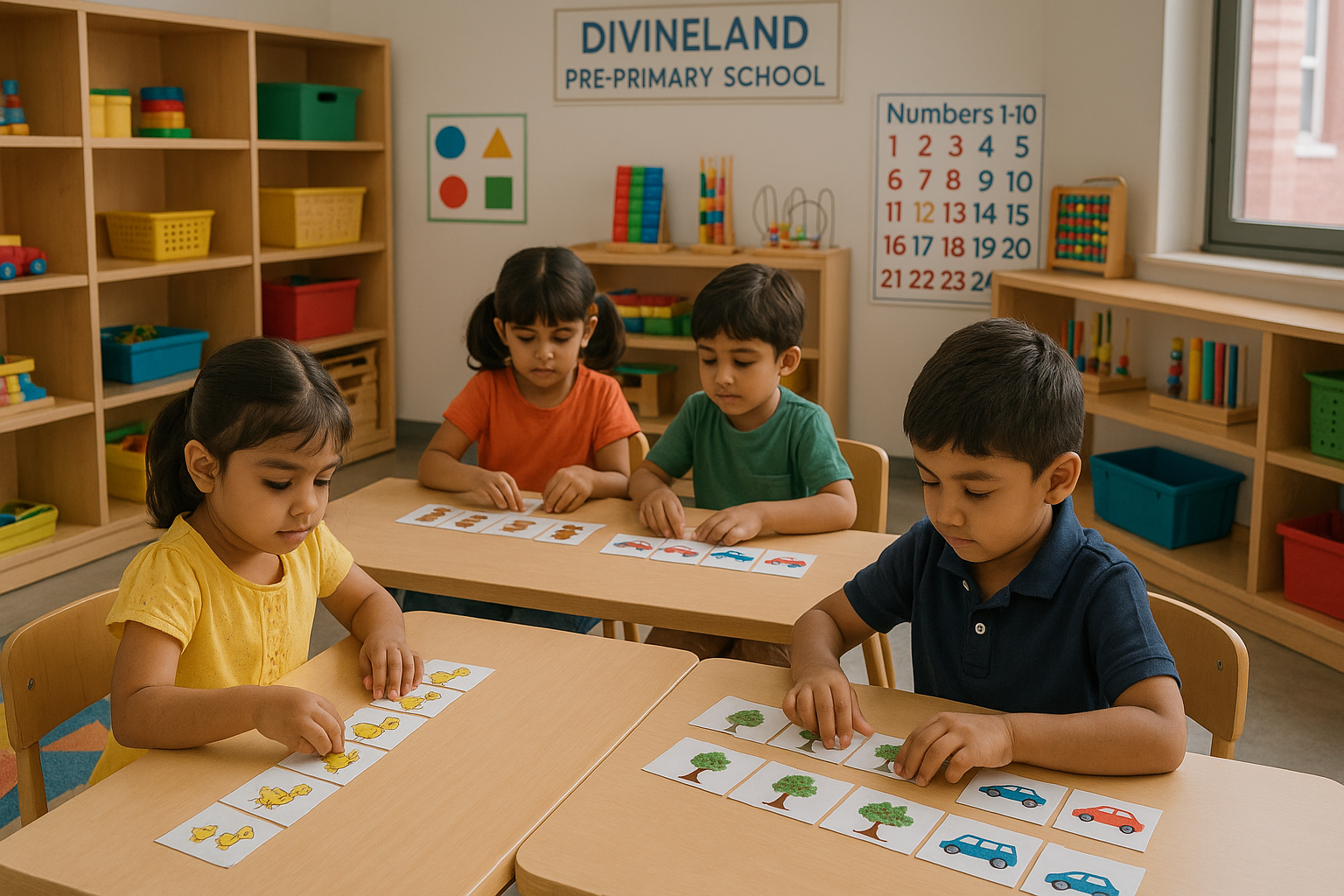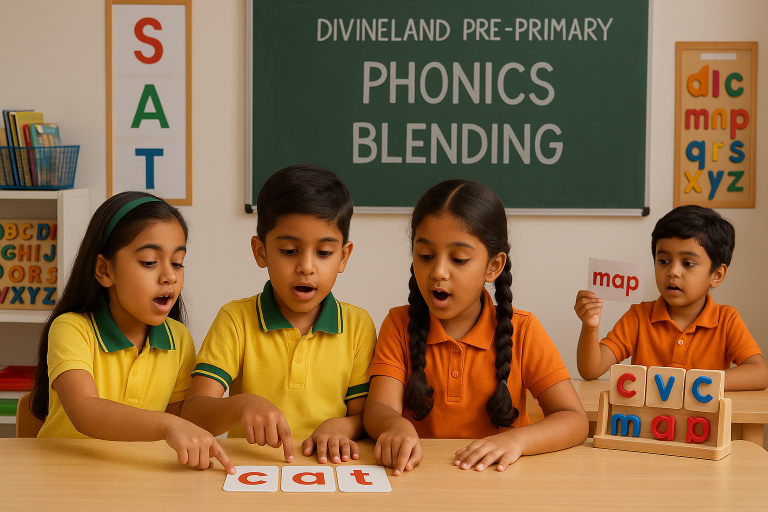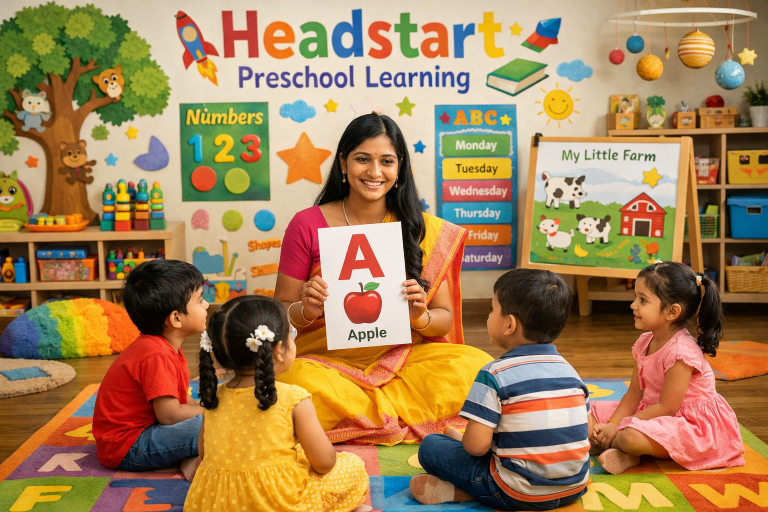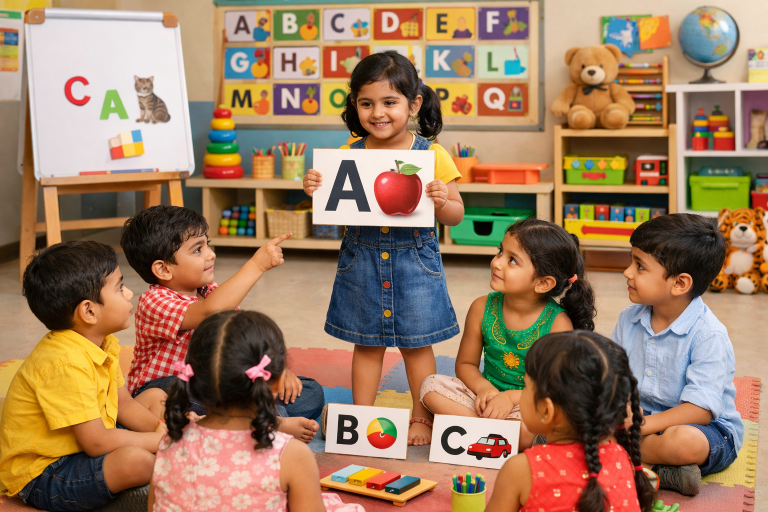
Logical Thinking Activities help pre-schoolers learn problem-solving skills in a fun and natural way. At this age, children are curious and eager to discover how things work, making it the right time to teach games and exercises that shape up their reasoning.
Simple puzzles, organising games, and daily problem-solving tasks are examples of Logical Thinking Activities that can improve their memory, attention, and decision-making. By adding Logical Thinking Activities in daily plans, parents and teachers can encourage young minds to think clearly, make connection, and grow more assured in learning.
What Are Logical Thinking Activities?
Logical Thinking Activities are learning tasks planned to develop a child’s capacity to reason, compare, study, and make conclusion. These activities help young children make relations between things, actions, or thoughts, improving their capacity to think independently.
For preschoolers, logical thinking doesn’t contain tough math or abstract reasoning. But, it starts with small actions like matching socks, sorting toys, or guessing what comes next in a story. These daily actions form the building blocks of logical thought.
Through Logical Thinking Activities, children learn to:
- Recognize patterns
- Classify objects
- Identify sequences
- Understand cause and effect
- Solve simple problems
Call or WhatsApp on +919082778593 / +918591021373, for more Admission Details.
Click Here, to download the brochure of Divineland Pre Primary School!
Why Are Logical Thinking Activities Important?
Logical Thinking Activities backs Brain Development and help form important skills such as attention, memory, and reasoning. These skills are important for learning through all subjects—whether it’s reading, math, or science.
Some major benefits include:
- Better focus and attention: Logical tasks help children stay engaged for longer periods.
- Improved memory: Repeating steps and recognizing patterns boosts recall.
- Stronger decision-making: Children begin to think before they act.
- Early problem-solving: Kids learn how to work through challenges calmly.
- Confidence in learning: Success with small tasks builds self-esteem.

Effective Logical Thinking Activities for Preschoolers
Below are detailed Logical Thinking Activities that can be easily done at home or in school. Each activity is simple yet effective.
Sorting Objects by Different Categories
- Sorting teaches classification—a main logical thinking talent. Give your child a mix of buttons, beads, or blocks. Ask them to sort these objects by colour, shape, size, texture.
- Why it works: Children begin to see differences and similarities. They also learn how to group items based on similar structures, which is a main part of logical reasoning.
Sequencing with Story Cards or Daily Routines
- Sequencing means putting things in a valid order. Use story cards that show steps of brushing teeth, going to school, or planting a seed.
- Why it works: Preschoolers learn that occasions have an order. Understanding “what comes next” improves guessing skills and helps them tell stories clearly.
Solving Age-Appropriate Puzzles
- Give puzzles with 4 to 12 pieces, according to your child’s ability. Help them look at the shapes and match the pictures.
- Why it works: This activity improves spatial reasoning and visual analysis. Kids learn to use trial and error to fit the pieces, improving problem-solving talents.
Matching Games Using Cards or Household Items
- Create matching cards with letters, numbers, animals, or shapes. You can also match socks, lids to containers, or shoes to pairs.
- Why it works: Matching is a form of comparison. These Logical Thinking Activities help the child focus, observe details, and spot relationships.
Guess the Missing Object
- Place a few items on a tray, let your child look at them, then cover the tray and take out one object secretly. Ask them to guess what’s missing.
- Why it works: This sharpens memory and encourages careful observation—both of which are needed for logical thought.
Building with Blocks or Lego
- Let children build towers, houses, or patterns using blocks. You can give simple challenges like, “Can you build something taller than your water bottle?”
- Why it works: These tasks involve planning, balance, and creativity. Kids also learn symmetry and trial-error correction, all through hands-on thinking.
Playing Board Games with Simple Rules
- Games like “Snakes and Ladders” or “Memory Match” are excellent Logical Thinking Activities. They teach turn-taking, rule-following, strategic moves.
- Why it works: Games introduce cause and effect and help children understand fairness and prediction. They also build patience.
Call or WhatsApp on +919082778593 / +918591021373, for more Admission Details.
Click Here, to download the brochure of Divineland Pre Primary School!

How to Make Logical Thinking Activities More Effective
- Keep instructions simple: Use short, clear language suitable to your child’s age.
- Be involved: Join the child through activities and ask guiding questions.
- Encourage talking: Let them explain their steps or choices. This improves reasoning and communication.
- Use real-life situations: Ask for help in setting the table or arranging laundry—daily routines are filled with logic.
- Praise the effort: Focus on the thinking method more than the result. This keeps the child driven.
Introducing Logical Thinking Activities in early childhood puts the base for academic success and everyday confidence. These activities are easy to set up, need few materials, and offer lasting value. Whether it’s through sorting games, puzzles, or building blocks, preschoolers profit from logical tests that stretch their minds in healthy ways. The key is stability, patience, and lots of backing.
Logical Thinking Activities shape the way young minds grow, helping children think clearly, solve problems, and achieve confidence early on. At Divineland Pre Primary School, these necessary skills are developed through play-based learning, planned programs, and caring educators. If you’re looking for a place where your child learns while enjoying every moment, Divineland is the right place. Give your preschooler the best start with activities that form thinking skills for life. Enroll today and watch your child’s mind blossom with purpose.
Boost your child’s future with Divineland Pre Primary School admissions today!
Call or WhatsApp on +919082778593 / +918591021373, for more Admission Details.
Click Here, to download the brochure of Divineland Pre Primary School!
FAQs
Why are Logical Thinking Activities Important for Preschoolers?
Logical thinking activities help children solve problems, make decisions, and build strong early learning foundations.
Can Parents do Logical Thinking Activities at Home?
Yes, simple games like puzzles, sorting, and pattern recognition can easily boost logical skills at home.
How does Divineland Pre Primary School Support Logical Thinking?
Divineland Pre Primary School uses fun, structured activities to nurture logical thinking and creativity in young learners.


